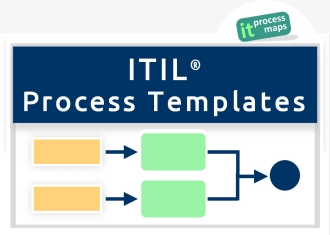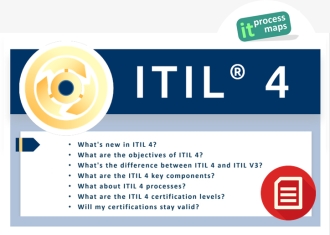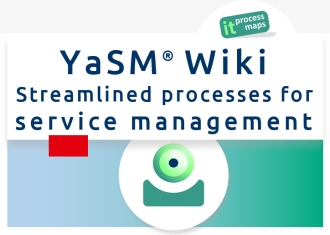Event Management: Difference between revisions
No edit summary |
mNo edit summary |
||
| Line 1: | Line 1: | ||
<seo metakeywords="itil event management, event management itil, event management process, itil v3 event management, event management itil" metadescription="Event Management: ITIL process definition - subprocesses - Additional information on ITIL Event Management." /> | |||
<imagemap> | |||
Image:ITIL-Wiki-de-es.jpg|DE - ES - Event Management|100px | |||
rect 0 0 50 30 [https://wiki.de.it-processmaps.com/index.php/Event_Management diese Seite auf Deutsch] | |||
rect 50 0 100 30 [https://wiki.es.it-processmaps.com/index.php/ITIL_Gestion_de_Eventos esta página en español] | |||
desc none | |||
</imagemap> | |||
<br style="clear:both;"/> | |||
== ITIL Event Management: Overview == | |||
'''Process Objective''': To filter and categorize Events and to decide on appropriate actions. Event Management is one of the main activities of Service Operations. | '''Process Objective''': To filter and categorize Events and to decide on appropriate actions. Event Management is one of the main activities of Service Operations. | ||
| Line 10: | Line 14: | ||
'''Part of''': [[ITIL V3 Service Operation|Service Operation]] | '''Part of''': [[ITIL V3 Service Operation|Service Operation]] | ||
'''Process Owner''': [[ | '''Process Owner''': [[Event Management#Additional Information on Event Management|IT Operations Manager]] | ||
==ITIL | == ITIL Event Management: Process Definition == | ||
[[Image:Itil-event-management.jpg|thumb=overview_event_management_itilv3_thumb.jpg|left|[https://wiki.en.it-processmaps.com/images/pdf/process_overview_event_management_itilv3.pdf ITIL Event Management]]] | |||
Essentially, the activities and process objectives of the Event Management process are identical in ITIL V3 and V2 (Event Management is part of ICT Infrastructure Management in ITIL V2). Interfaces between Event Management and the other ITIL processes were adjusted in order to reflect the new ITIL V3 process structure. | |||
The following sub-processes are part of [[Event Management|ITIL Event Management]]: | |||
<br style="clear:both;"/> | |||
=== Sub-Processes === | |||
;Maintenance of Event Monitoring Mechanisms and Rules | ;Maintenance of Event Monitoring Mechanisms and Rules | ||
:Process Objective: To set up and maintain the mechanisms for generating meaningful Events and effective rules for their filtering | :Process Objective: To set up and maintain the mechanisms for generating meaningful [[Event Management#Event Record|Events]] and effective rules for their filtering and [[Event Management#Event Categories and Correlation Rules|correlating]]. | ||
;Event Filtering and Categorization | ;Event Filtering and Categorization | ||
| Line 33: | Line 38: | ||
;Event Review and Closure | ;Event Review and Closure | ||
Process Objective: To check if Events have been handled appropriately and may be closed. This process also makes sure | :Process Objective: To check if Events have been handled appropriately and may be closed. This process also makes sure that Event logs are analysed in order to identify [[Event Management#Event Trends and Patterns|trends or patterns]] which suggest corrective action must be taken. | ||
== | ===== Downloads ===== | ||
* [[Roles | Use the following links to open the process overview of Event Management showing the most important interfaces: | ||
* [[Media:Itil-event-management.jpg|ITIL Event Management (.JPG)]] | |||
* [https://wiki.en.it-processmaps.com/images/pdf/process_overview_event_management_itilv3.pdf ITIL Event Management (.PDF)]'' | |||
=== ITIL Terms: Event Management === | |||
;<span id="Event Categories and Correlation Rules">Event Categories and Correlation Rules</span> | |||
:Rules and criteria used to decide upon an appropriate response to an Event. Categorization and Correlation Rules are typically used by Event Monitoring systems. | |||
;<span id="Event Record">Event Record</span> | |||
:A change of state which has significance for the management of a Configuration Item or service. The term Event is also used to mean an alert or notification created by any IT service, Configuration Item or monitoring tool. Events typically require IT operations personnel to take actions, and often lead to Incidents being logged. | |||
;<span id="Event Trends and Patterns">Event Trends and Patterns</span> | |||
:Any trends and patterns identified during analysis of significant Events, which suggest that improvements to the infrastructure are needed. | |||
== Additional Information on Event Management == | |||
==== ITIL Roles ==== | |||
;IT Operations Manager - Process Owner | |||
:An IT Operations Manager will be needed to take overall responsibility for all of the IT Operations Management activities, which include Operations Control and Facilities Management. | |||
;IT Operator | |||
:IT Operators are the staff who perform the day-to-day operational activities. | |||
:Typical responsibilities include: Performing backups, ensuring that scheduled jobs are performed, installing standard equipment in the data center. | |||
<i><small>[[Main Page|Home]] > [[ITIL Processes]] > [[ITIL V3 Service Operation|Service Operation]] > [[Event Management|ITIL Event Management]]</small></i> | |||
<!-- This page is assigned to the following categories: --> | |||
[[Category:ITIL V3]][[Category:ITIL process]][[Category:Service Operation|Event Management]][[Category:Event Management|!]] | |||
<!-- --- --> | |||
Revision as of 11:33, 13 July 2011
<seo metakeywords="itil event management, event management itil, event management process, itil v3 event management, event management itil" metadescription="Event Management: ITIL process definition - subprocesses - Additional information on ITIL Event Management." />

ITIL Event Management: Overview
Process Objective: To filter and categorize Events and to decide on appropriate actions. Event Management is one of the main activities of Service Operations.
Part of: Service Operation
Process Owner: IT Operations Manager
ITIL Event Management: Process Definition
Essentially, the activities and process objectives of the Event Management process are identical in ITIL V3 and V2 (Event Management is part of ICT Infrastructure Management in ITIL V2). Interfaces between Event Management and the other ITIL processes were adjusted in order to reflect the new ITIL V3 process structure.
The following sub-processes are part of ITIL Event Management:
Sub-Processes
- Maintenance of Event Monitoring Mechanisms and Rules
- Process Objective: To set up and maintain the mechanisms for generating meaningful Events and effective rules for their filtering and correlating.
- Event Filtering and Categorization
- Process Objective: To filter out Events which can be ignored, and to assign categories to Events indicating their significance.
- Event Correlation and Response Selection
- Process Objective: To interpret the meaning of an Event and select a suitable response.
- Event Review and Closure
- Process Objective: To check if Events have been handled appropriately and may be closed. This process also makes sure that Event logs are analysed in order to identify trends or patterns which suggest corrective action must be taken.
Downloads
Use the following links to open the process overview of Event Management showing the most important interfaces:
ITIL Terms: Event Management
- Event Categories and Correlation Rules
- Rules and criteria used to decide upon an appropriate response to an Event. Categorization and Correlation Rules are typically used by Event Monitoring systems.
- Event Record
- A change of state which has significance for the management of a Configuration Item or service. The term Event is also used to mean an alert or notification created by any IT service, Configuration Item or monitoring tool. Events typically require IT operations personnel to take actions, and often lead to Incidents being logged.
- Event Trends and Patterns
- Any trends and patterns identified during analysis of significant Events, which suggest that improvements to the infrastructure are needed.
Additional Information on Event Management
ITIL Roles
- IT Operations Manager - Process Owner
- An IT Operations Manager will be needed to take overall responsibility for all of the IT Operations Management activities, which include Operations Control and Facilities Management.
- IT Operator
- IT Operators are the staff who perform the day-to-day operational activities.
- Typical responsibilities include: Performing backups, ensuring that scheduled jobs are performed, installing standard equipment in the data center.
Home > ITIL Processes > Service Operation > ITIL Event Management






